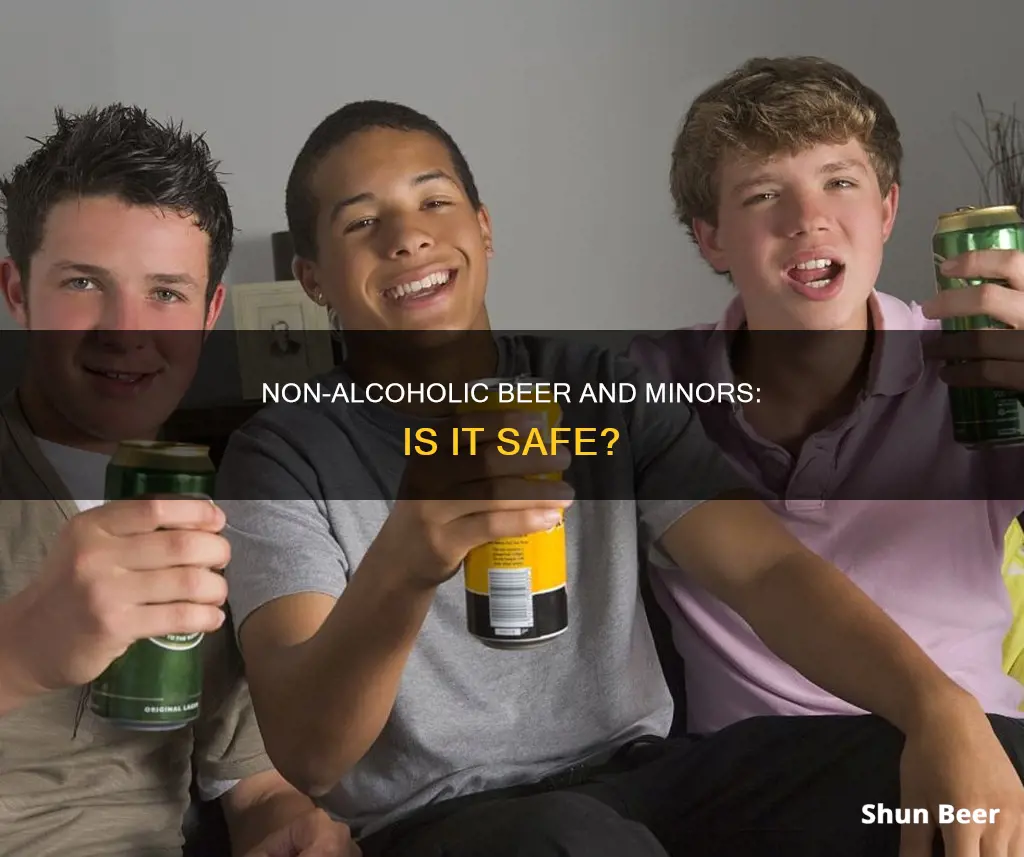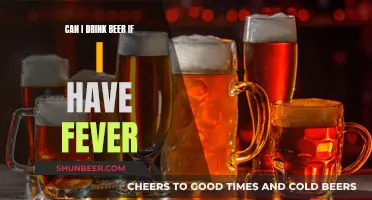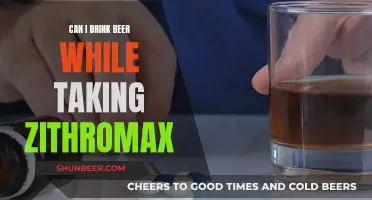
Non-alcoholic beer has become increasingly popular, and with it, the question of whether minors can legally drink it. In the United States, the National Minimum Drinking Age Act of 1984 prohibits the sale of beverages containing alcohol to individuals under 21. However, non-alcoholic beer, typically defined as beer with less than 0.5% alcohol by volume (ABV), falls into a legal grey area. While federal law permits minors to consume non-alcoholic beer, individual states have varying regulations. Some states allow minors to drink non-alcoholic beer with parental consent or in their presence, while others have set the minimum age for consumption at 18. Ultimately, the legality of minors drinking non-alcoholic beer depends on the specific laws and policies of each state and retailer.
| Characteristics | Values |
|---|---|
| Federal Law | Minors under the age of 21 can consume non-alcoholic beverages, even those with less than 0.5% ABV. |
| State Law | Mississippi, North Dakota, and Ohio only allow the drinking of non-alcoholic beer for those 18 and older. 14 states prohibit minors from drinking non-alcoholic beer. |
| Purchase | 17 states bar the purchase of non-alcoholic beer by those under 21. |
| Exceptions | Minors can drink alcoholic beverages with parental consent in Colorado, Maryland, Montana, New York, Texas, Oregon, Washington, Wisconsin, and Wyoming. |
What You'll Learn
- Non-alcoholic beer may contain a trace amount of alcohol
- Minors can drink non-alcoholic beer in most US states
- Minors can buy non-alcoholic beer in some US states
- Non-alcoholic beer is regulated by the Federal Alcohol Administration Act
- Minors drinking non-alcoholic beer in public settings is prohibited in some US states

Non-alcoholic beer may contain a trace amount of alcohol
Non-alcoholic beer is often marketed as a healthier alternative to alcoholic beer. While it is true that non-alcoholic beer contains significantly less alcohol than regular beer, it is important to note that it may still contain trace amounts of alcohol.
In the United States, beverages with an alcohol content of up to 0.5% by volume can be labelled as "non-alcoholic". This means that non-alcoholic beers can contain up to 0.5% alcohol, which is similar to the amount found in some fruit juices, breads, and ripe bananas. While this is not enough alcohol to cause intoxication or a hangover, it is important to be aware that non-alcoholic beer is not completely alcohol-free.
The amount of alcohol in non-alcoholic beer can vary depending on the brand and brewing process. Some non-alcoholic beers may contain up to 0.4% alcohol per serving, while others may have less than 0.5%. Even beers marketed as alcohol-free, such as Heineken 0.0, Budweiser Zero, and Guinness 0.0, may contain trace amounts of alcohol.
The presence of alcohol in non-alcoholic beer has important implications for certain groups of people. For example, individuals with alcohol use disorders or those in recovery may want to avoid non-alcoholic beer due to the potential for triggering cravings or relapse. Additionally, pregnant individuals are generally advised to avoid any alcohol consumption to prevent fetal alcohol spectrum disorder (FASD). While non-alcoholic beer may seem like a safe alternative, it may still contain small amounts of alcohol, posing a potential risk to the developing fetus.
The legal status of non-alcoholic beer for minors is also complex and varies by state. While the National Minimum Drinking Age Act of 1984 defines "alcoholic beverages" as those containing more than 0.5% alcohol by volume, some states have their own regulations regarding the sale and consumption of non-alcoholic beer by minors. For example, Mississippi, North Dakota, and Ohio only allow the drinking of non-alcoholic beer by those aged 18 and older, while 14 states prohibit minors from consuming non-alcoholic beer altogether.
In summary, while non-alcoholic beer may be a healthier alternative to regular beer for some people, it is important to be aware that it may still contain trace amounts of alcohol. The presence of alcohol can have implications for certain individuals, and the legal status of non-alcoholic beer for minors varies depending on local regulations. As such, it is important to check the labels of non-alcoholic beers and understand the local laws before consuming or purchasing these beverages.
Beer and UTI: What You Need to Know
You may want to see also

Minors can drink non-alcoholic beer in most US states
The National Minimum Drinking Age (NMDA) Act of 1984 defines "alcoholic beverages" as "beer, distilled spirits, and wine containing one-half of 1% or more of alcohol by volume". Therefore, non-alcoholic beer, which typically contains less than 0.5% ABV, is not considered a true "beer" under federal law, and is thus legally consumable by anyone under the age of 21.
However, each state has its own unique laws and regulations surrounding the sale and consumption of alcohol, which can create confusion over the legality of non-alcoholic beer for minors. For example, some states, such as Alabama, Louisiana, Mississippi, and North Carolina, allow minors to consume non-alcoholic beer with parental permission or in the presence of a parent or guardian. On the other hand, states like Oregon, West Virginia, and Wyoming prohibit the purchase of non-alcoholic beer by minors, while Texas, Minnesota, Wisconsin, and New Jersey do not require individuals to be 21 to buy or consume it.
The varying state laws and retailer policies make it essential for individuals to understand their local regulations and retailer policies before attempting to purchase or consume non-alcoholic beer as a minor.
The Ultimate Beer Snorkel Experience: How Does It Work?
You may want to see also

Minors can buy non-alcoholic beer in some US states
In the United States, the legal drinking age is 21. However, this only applies to alcoholic beverages, which are defined as containing at least 0.5% alcohol by volume (ABV). Non-alcoholic beer, on the other hand, typically contains less than 0.5% ABV, which means it falls into a legal grey area. While the federal government does not consider non-alcoholic beer to be an alcoholic beverage, individual states have their own regulations regarding the sale and consumption of these drinks by minors.
In some US states, such as Ohio, Mississippi, and North Dakota, minors are allowed to consume non-alcoholic beer, but the laws vary. For example, in Mississippi and North Dakota, minors aged 18-21 can consume non-alcoholic beer with parental permission or in the presence of a parent or guardian. In Ohio, the minimum age to purchase non-alcoholic beer is 18. On the other hand, 14 states prohibit minors from drinking non-alcoholic beer altogether, and 17 states bar them from purchasing it.
The laws surrounding the sale and consumption of non-alcoholic beer by minors in the US are complex and often depend on state and local regulations. While the federal government does not consider non-alcoholic beer to be an alcoholic beverage, individual states have differing definitions of what constitutes an alcoholic drink. As a result, the laws regarding the sale and consumption of non-alcoholic beer by minors can vary widely from state to state.
Ultimately, it is up to parents and guardians to decide whether to allow their children to consume non-alcoholic beer. While it may be legally permissible in some states, there are still potential risks associated with minors consuming these beverages. For example, a study from Japan found that adolescents who consumed non-alcoholic beverages that mimicked alcohol had a greater interest in consuming alcohol. Therefore, it is essential for parents and guardians to carefully consider the potential risks and make an informed decision based on their own values and beliefs.
Beer's Anti-Inflammatory Benefits: Fact or Fiction?
You may want to see also

Non-alcoholic beer is regulated by the Federal Alcohol Administration Act
The Federal Alcohol Administration Act (FAAA) regulates malt beverages, regardless of their alcohol content, if they meet the Act's requirements of containing some malted barley, some hops (or hop parts or products), and having been subject to fermentation. This means that non-alcoholic beers are still regulated by the FAAA, even though their alcoholic content is below what is considered an alcoholic beverage.
The FAAA does not indicate a minimum alcohol by volume (ABV) percentage. This is because of a legal anomaly where any malt beverage is regulated by the FAAA. However, the legal drinking age of 21 years old is not a federal rule, but a rule set by each individual state, and so the answer to whether minors can drink non-alcoholic beer depends on which state you're in.
The Internal Revenue Code (IRC) defines "beer" as a fermented beverage containing 0.5% ABV or more, brewed or produced from malt, wholly or in part, or from any substitute for malt. Under the IRC, most products considered non-alcoholic beers would be defined as "cereal beverages" and so be subject to any applicable IRC laws relating to "cereal beverages". The IRC specifically exempts any product with an ABV of less than 0.5% from all federal alcohol excise taxes.
The FAAA, however, has slightly different definitions of these products. The FAAA governs what it calls "malt beverages," defined as fermented beverages "derived from an infusion or decoction in potable water of both malted barley and hops." Traditional non-alcoholic beer would then most likely fall under the class type of malt beverages called "cereal beverages", which are malt beverages that contain less than 0.5% ABV. Notably, to be subject to the FAAA, a non-alcoholic beer would first have to be considered a "malt beverage," so any malt beverage not made with hops would not be subject to the FAAA.
The FAAA sets out rules for non-alcoholic beer labelling. Generally, the standard labelling requirements for full-strength beer apply to non-alcoholic beer, to include the producer, type, and volume. Unlike traditional beers, non-alcoholic beer labels must prominently include "Nontaxable under section 5051 I.R.C." COLAs are only required if the product is subject to the FAAA and if it is sold interstate. Additionally, the Government Health Warning is only required on products containing more than 0.5% ABV.
Vaccinated and Thirsty: Beer and COVID Vaccine Timing
You may want to see also

Minors drinking non-alcoholic beer in public settings is prohibited in some US states
The laws surrounding minors drinking non-alcoholic beer vary across the United States. While federal law permits minors to consume non-alcoholic beverages, some states have their own legislation prohibiting the purchase and consumption of such drinks by minors. This discrepancy is due to the Federal Alcohol Administration Act (FAA), which regulates any malt beverage, even those with an alcohol content below the legal definition of an alcoholic drink.
The National Minimum Drinking Age (NMDA) Act of 1984 defines an alcoholic beverage as containing "one-half of 1% or more of alcohol by volume". Therefore, non-alcoholic drinks with less than 0.5% ABV are not considered "beer" and are federally legal for minors to consume. However, this does not prevent individual states from implementing their own restrictions.
For example, three states (Mississippi, North Dakota, and Ohio) only allow the drinking of non-alcoholic beer for those 18 and older. Additionally, 14 states prohibit minors from drinking non-alcoholic beer, and 17 states bar the purchase of these drinks by those under 21.
The laws regarding minors and non-alcoholic beverages are complex and constantly evolving. While some states may allow minors to drink non-alcoholic beer with parental permission or supervision, others may have more stringent restrictions. For instance, Kansas prohibits the consumption of any "cereal malt beverage" that has undergone fermentation, which would include most non-alcoholic beers.
The varying state laws and retailer policies make it challenging to provide a definitive answer. Ultimately, it is the responsibility of parents and guardians to research and understand the specific regulations in their state before allowing their children to consume non-alcoholic beer.
Drinking and Driving: One Beer, Safe to Drive?
You may want to see also
Frequently asked questions
Non-alcoholic beer typically contains up to 0.5% alcohol by volume (ABV). In the US, the National Minimum Drinking Age (NMDA) Act of 1984 states that "alcoholic beverages" contain 0.5% ABV or more. Therefore, at a federal level, minors can drink non-alcoholic beer. However, some states have their own laws—Mississippi, North Dakota, and Ohio only permit drinking non-alcoholic beer for those 18 and older, and 14 other states prohibit minors from drinking it.
This depends on the state. In 17 states, minors are barred from buying non-alcoholic beer, and in Ohio, the minimum age is 18. However, if a state allows minors to consume non-alcoholic beer, they typically also permit them to purchase it.
Minors can drink non-alcoholic beer in public in Ohio, Louisiana, Massachusetts, and Texas, as long as they have the consent of a parent or guardian over the age of 21, who must purchase the drink for them.
Yes, minors can drink non-alcoholic beer at home with the consent and/or in the presence of a parent or guardian.
It is advised to avoid drinking non-alcoholic beer while driving, as the authorities in most states view non-alcoholic beer in the same way as alcoholic beverages.







